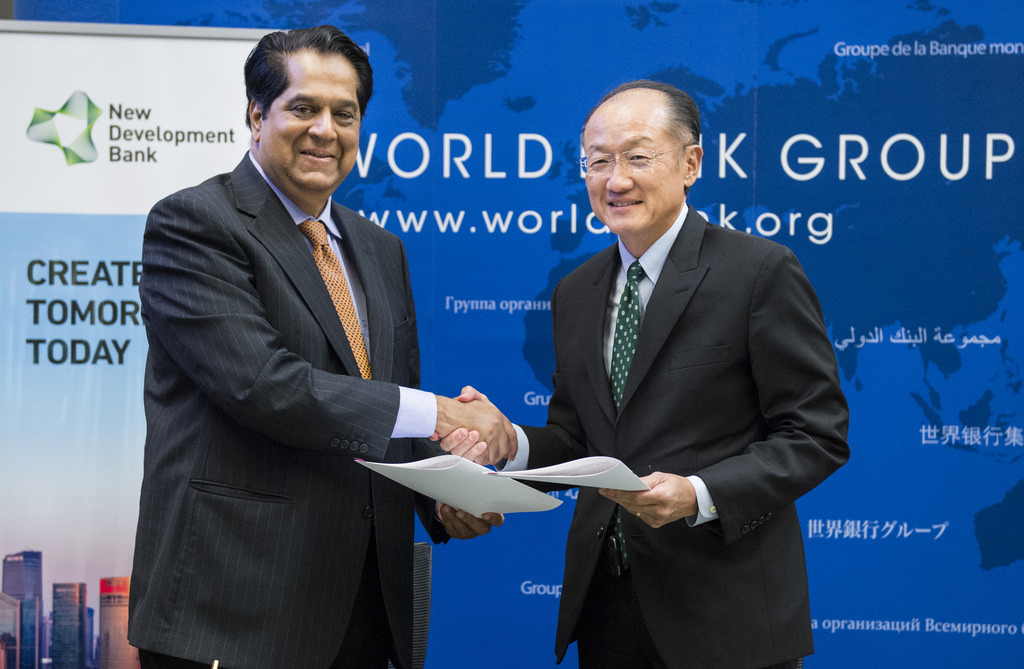 In September 2016, World Bank Group President Jim Yong Kim and New Development Bank (NDB) President K.V. Kamath signed a memorandum of understanding between the two institutions, to strengthen cooperation in addressing the world’s enormous infrastructure needs.
In September 2016, World Bank Group President Jim Yong Kim and New Development Bank (NDB) President K.V. Kamath signed a memorandum of understanding between the two institutions, to strengthen cooperation in addressing the world’s enormous infrastructure needs.
The New Development Bank (NDB), sometimes referred to the ‘BRICS Bank’, has learned to operate in the shadows of its far more visible cousin, the Asian Infrastructure Investment Bank (AIIB), which was launched in 2015 to much international fanfare in Beijing. While geopolitical analysts from around the world excitedly refer to the AIIB as proof of Chine’s global ambitions, few of them bother to study the NDB, with its headquarters 1200 kilometers further South, in Shanghai.
The reasons for this difference are quite obvious. Not only is the AIIB larger (its authorized capital stock is $100 billion, whereas the initial subscribed capital of the NDB is $50 billion), but is also has 56 members from around the world, making it China’s most ambitious foreign policy projects. While the AIIB is often seen as a threat to the world’s most established development banks, such as the World Bank and the Asian Development Bank), the NDB has yet to articulate its strategy more clearly. While Moody’s, a rating agency, recently assigned first-time Aaa issuer rating to the Asian Infrastructure Investment Bank, the NDB is currently only rated by Chinese agencies and hopes for its first rating by an international rating agency by the end of the year.
The NDB’s recently launched 5-year plan, which provides a few more details about the bank’s activities, yet it does not contain enough hard facts that would sustain a broader public debate about the bank — it remains to be seen how the NDB’s broadly articulated goals will play out in practice. The key question remains: where will the bank innovate, and where will it operate like existing institutions? Still, even a somewhat vague document is welcome news — after all, civil society representatives in particular had long complained about how little information had been made available about the new institution’s standards and practices. Yet while there is a public debate about the NDB in India and South Africa (though largely of the non-critical, pro-government sort), no such debate exists in Brazil, where it is not the Foreign Ministry, but the Ministry of Finance in charge of the country’s participation.
The NDB is now officially open to accept new membership applications. While China actively sought to attract a large number of countries to the AIIB, the NDB seeks to increase membership “gradually”. Yet while Brazil and China have welcomed bringing in both developing and developed countries, Russia’s President Vladimir Putin made clear during the recent meeting in Hamburg, on the sidelines of the G20 summit, that he would not want to see countries join that are currently imposing economic sanctions on Russia. That would exclude not only the United States, but also any EU member state.
The bank’s focus will, as widely expected, lie on sustainable infrastructure development — i.e. areas like clean energy, transport infrastructure, irrigation, water resource management and sanitation. As the document says, and it promises to dedicate about two-thirds of financing commitments in its first five years to this area, where its founders identify a significant unmet demand — yet it also mentions “traditional infrastructure”, terms that are not clearly defined. Local currency financing is already an essential component of NDB’s value proposition, as it seeks to mitigate risks faced by borrowers. In addition to yuan-denominated bonds, the bank is expected to issue bonds in South African, Brazilian and South African currency.
What is perhaps most innovative is the NDB’s decision to opt for a non-resident Board of Directors, which, according to the bank, will reduce administrative costs and avoid that the NBD will transform into a World Bank-like behemoth that dramatically expanded its activities and now spends a considerable amount on managing itself.
The bank’s plan suggests that the NDB will continue to be the subject of niche publications until new members will join, whereas the AIIB will be scrutinized by those caring about the bigger picture. That may not be a bad thing for the New Development Bank, as it will be able to steer clear of broader geopolitical issues. Still, it won’t be able to escape the healthy scrutiny of scholars and civil society organizations which will seek to hold it to account and verify whether it can live up to its goals.
Read more:
What to look out for in the run-up to the 9th BRICS Summit in Xiamen








